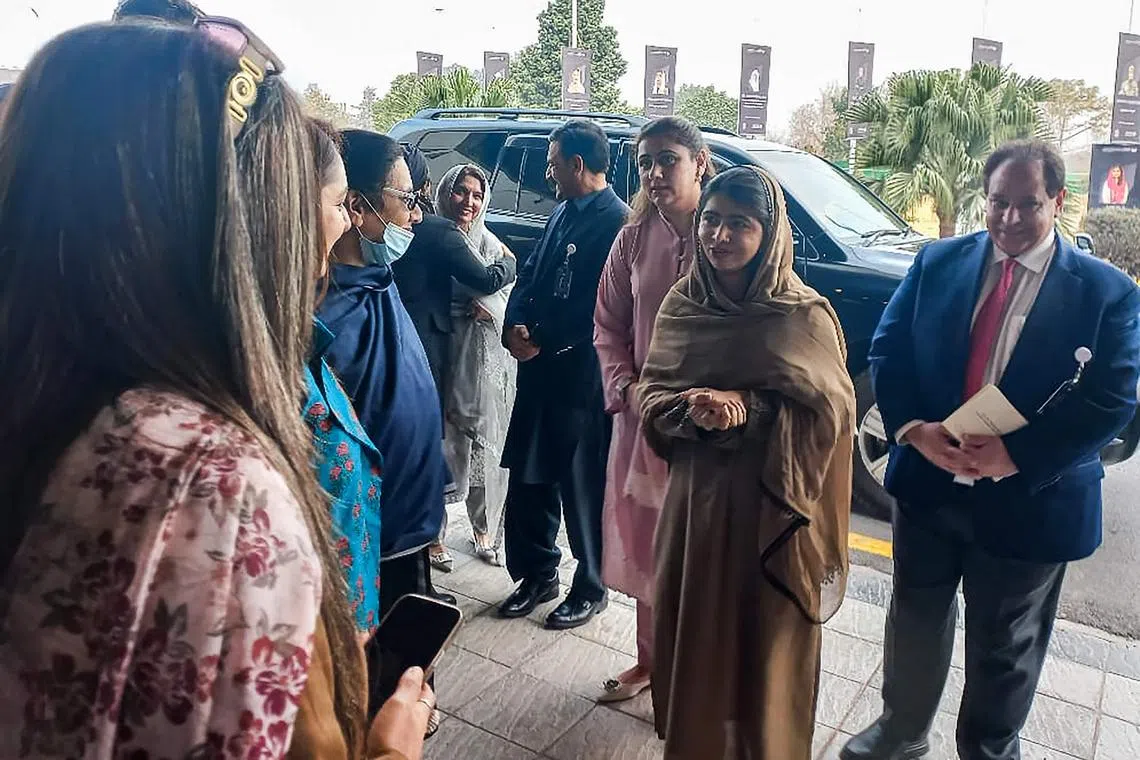Activist Malala Yousafzai attends Muslim girls’ education conference snubbed by Taliban
Sign up now: Get insights on Asia's fast-moving developments

Nobel Peace Prize laureate Malala Yousafzai (second from right) arriving in Islamabad on Jan 11 to attend a global summit on girls’ education in the Islamic world.
PHOTO: AFP
ISLAMABAD – Nobel Peace Prize laureate Malala Yousafzai said she was “overwhelmed” to be back in her native Pakistan on Jan 11, as the country’s prime minister launched a global summit on girls’ education in the Islamic world.
The summit has brought together education leaders from Muslim-majority countries, but has been snubbed by Pakistan’s neighbour Afghanistan – the only country in the world where girls are banned from school
“The Muslim world including Pakistan faces significant challenges in ensuring equitable access to education for girls,” Prime Minister Shehbaz Sharif said at the opening of the summit, backed by the Muslim World League.
“Denying education to girls is tantamount to denying their voice and their choice, while depriving them of their right to a bright future.”
Federal Minister for Education Khalid Maqbool Siddiqui told AFP that the government “had extended an invitation to Afghanistan, but no one from the Afghan government was at the conference”.
Ms Yousafzai, who was shot by Pakistan Taliban militants in 2012 when she was a schoolgirl, is due to address the conference on Jan 12.
“I’m truly honoured, overwhelmed and happy to be back in Pakistan,” she told AFP as she arrived at the conference in the capital Islamabad with her parents.
Earlier on Jan 10, she posted on social media that she would speak about “why leaders must hold the Taliban accountable for their crimes against Afghan women and girls”.
Since returning to power in 2021, the Taliban government there has imposed an austere version of Islamic law that the United Nations has called “gender apartheid”.
Pakistan is facing its own severe education crisis with more than 26 million children out of school, mostly as a result of poverty, according to official government data – one of the highest figures in the world.
Mr Sharif said “inadequate infrastructure and safety concerns, as well as deeply entrenched societal norms” were barriers to girls’ education.
Ms Zahra Tariq, a 23-year-old studying clinical psychology, who attended the opening of the summit, told AFP: “At last, we have a good initiative on Muslim girls’ education...
“Those in rural areas are still facing problems. In some cases, their families are the first barrier.”
Ms Yousafzai became a household name after she was attacked by Pakistan Taliban militants on a school bus in the remote Swat valley in 2012.
Militancy was widespread in the region at the time, as the war between the Afghan Taliban and Nato forces raged across the border in Afghanistan.
The Pakistan Taliban and Afghan Taliban are separate groups but share close links and similar ideologies, including a strong disbelief in educating girls.
Ms Yousafzai was evacuated to the United Kingdom and went on to become a global advocate for girls’ education and, at the age of 17, the youngest Nobel Peace Prize winner. AFP


